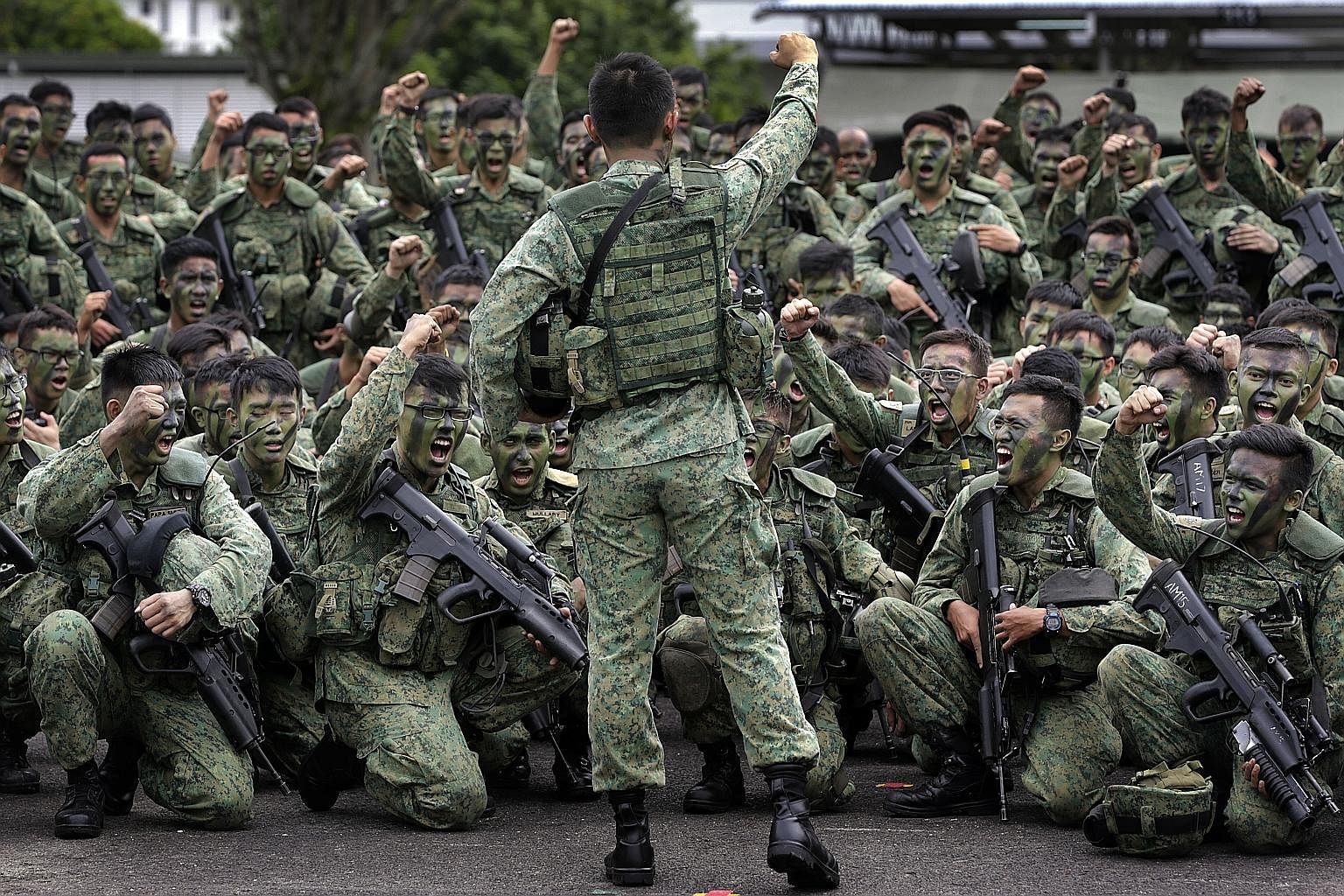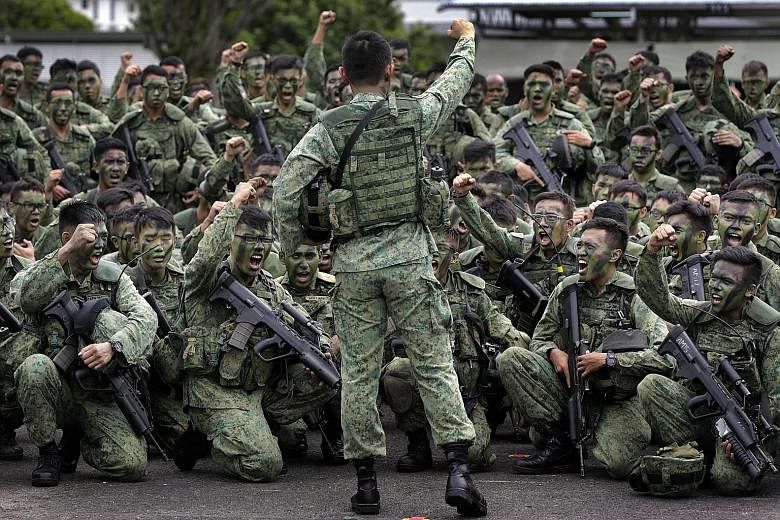I read with interest the changing stance of governments in Europe and the Persian Gulf towards military conscription. Countries like France, which abolished conscription at the end of the Cold War, are considering reinstating it. Others like Lithuania, the United Arab Emirates and Qatar have recently legislated mandatory conscription, and Sweden has decided earlier this month to reintroduce it. These reversals remind me of the discussions we had a few years ago in the Steering Committee of the Committee to Strengthen National Service (CSNS), of which I was a member.
Since Singapore became independent in 1965, national service has been the cornerstone of our nation's defence and security, and it remains so. As Second Minister for Defence Ong Ye Kung said at the recent Committee of Supply debate, the geopolitical environment may transition from a benign to hostile one without warning, but a capable and credible military cannot be built overnight.
Today, as we mark the 50th anniversary of the National Service (Amendment) Act, the commitment of servicemen, and the support of their families, employers and the community, remain vital in safeguarding our nation. And that is why as Singapore's society and our threat environment changed over the last 50 years, the NS system has also evolved since its inception in 1967, to maintain effectiveness and strike the right balance with our country's many other needs.
I have seen former operationally ready national servicemen, who come into contact with the NS system again a generation later when their sons enlist, react with astonishment at the improvements in the NS system and the modernisation of the Singapore Armed Forces (SAF), the Singapore Police Force (SPF) and the Singapore Civil Defence Force (SCDF). Even for me, recalling my enlistment in the mid-1990s and the uniform I wore, the rifle I used and even the food I ate and comparing that to what I see today makes me realise that all these aspects of NS have now been completely overhauled. When I first became an NSman, I was issued a green pocket booklet in which attendance at in-camp trainings (ICTs) had to be written, signed and stamped by hand. Today, everything is recorded digitally, networked, and online.
Even so, we should never stop trying to enhance our NS system. The CSNS was the next step in this continual process of adapting the NS system to current and future realities. It was set up four years ago to examine how the NS system can be strengthened for the future, to better serve Singapore and Singaporeans. In many ways, the CSNS conducted a review the likes of which had never before been done in public.
Over the course of a year, my fellow committee members and I visited numerous SAF, SPF and SCDF camps and spoke with regulars, as well as national servicemen and women alike. We examined the core policies behind NS, its raison d'etre, its history, its relevance today and in the future. We pulled no punches in discussing the challenges NS or our national servicemen face. With the help of volunteers and the Civil Service, we also engaged over 40,000 people from all walks of life, ranging from school students to senior citizens, in deep discussions. Some CSNS members also visited other countries to see and learn from their NS systems first-hand.

The diverse backgrounds and experiences of the CSNS members contributed to lively discussions and different perspectives at our meetings and in our engagements with various stakeholders. The public and inclusive nature of the CSNS journey made it meaningful not just for national servicemen, but also for the many Singaporeans who came forward with their feedback or followed the media reports.
I recall hosting one session with students from Victoria Junior College and being surprised by the enthusiasm they shared for NS, both the young men and women alike. I recall being struck by how the students had a shared understanding on the importance of NS, both for national defence and as a common identity that binds us together.
What we learnt during the CSNS journey, which is probably no secret to most, was that NS is a uniquely Singaporean experience.
Many countries stopped or blunted their conscription policies not because they were no longer necessary for their defence, but because they no longer had the political will and public support to maintain NS.
The fact that recent surveys have shown that NS has the support of an overwhelming majority of Singaporeans is heartening, but it is no accident and it should not be taken for granted. NS enjoys very strong support in Singapore precisely because our leaders work hard to communicate the importance of NS and set up committees like the CSNS to ensure the NS system works well.
The CSNS eventually recommended 30 changes to the NS system, all of which were accepted and implemented by the Government to my benefit and that of my fellow servicemen.
For example, with everyone's lives more interconnected than ever, be it through overseas travel or mobile communications, I personally enjoy the convenience of having to notify the Mindef Notification Centre only for longer trips and to be able to use laptops and iPads in non-sensitive camp areas during ICTs.
As we commemorate 50 years of NS this year, I remain convinced that Singaporeans' continued support for NS is vital to ensuring the future peace and progress of our country. The CSNS initiatives have strengthened and will continue to strengthen NS. In turn, a stronger NS system will help secure a better future for Singapore. In another decade or two, I look forward to reading about a future generation of Singaporeans convening another CSNS to consider adjustments to the NS system to suit their future society and their threat environment.
I have no doubt that a strong NS system will be necessary for the foreseeable future because, as Minister for Defence Ng Eng Hen said several weeks ago on the 75th anniversary of the fall of Singapore, the "two bitter but valuable lessons" we learnt from the Japanese Occupation were: "One, you cannot depend on others to defend you, and two, the strong do what they can and the weak suffer what they must." The price of freedom continues to be eternal vigilance.
•LTC (NS) Suresh Divyanathan was a member of the CSNS Steering Committee from 2013-14. He is a lawyer in private practice, and continues to serve NS on the Reservist on Voluntary Extended Reserve Service scheme as Chief of Staff of an armoured brigade.

